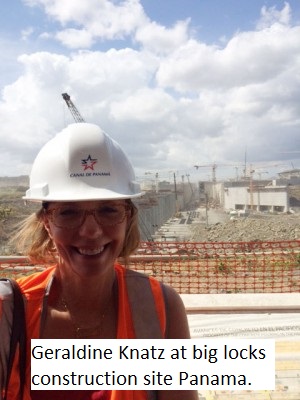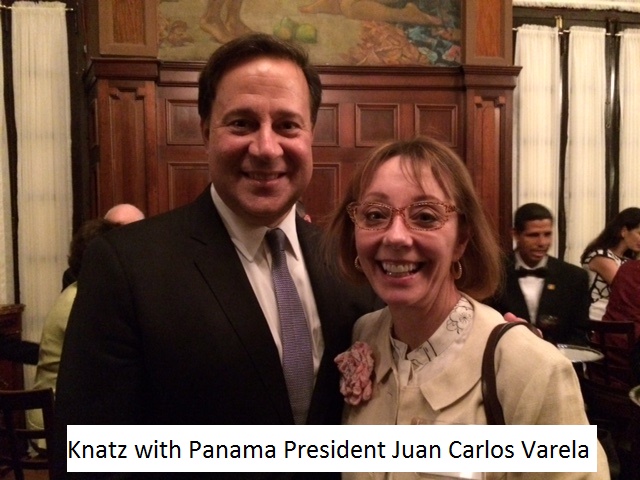News | Knatz Informs Congress Officials on Effects of Panama Canal Expansion
Stop the VideoNews

METRANS UTC
Knatz Informs Congress Officials on Effects of Panama Canal Expansion
Thursday, March 12, 2015

By Matthew Kredell
Geraldine Knatz, Professor of the Practice of Policy and Engineering, traveled to Panama in February to help inform members of the U.S. Congress on what Panama Canal expansion means for North America.
Taking part in the Aspen Institute Congressional Program, Knatz, who holds a joint appointment at the USC Price School of Public Policy and the USC Viterbi School of Engineering, presented her research to 15 legislators from the Senate and House of Representatives. She drew on her experience as the first woman to serve as director of the Port of Los Angeles, a post she held from 2006 to 2014.
A key point Knatz made was that developments in the global maritime transportation industry, particularly the consolidation of shipping operations, could have significantly more of an impact on individual ports than the canal expansion.
“For many of them, they were not familiar with port dynamics or the ocean shipping industry,” Knatz said. “Any time I get the chance to share knowledge with elective representatives, I try to focus my talk on the kind of decisions they have to make.”
Participating in an Aspen Institute program requires the invited scholars to submit a paper prior to the event. Knatz – whose paper was titled “The Panama Canal Expansion: What It Means for the U.S. and the Hemisphere” – and the CEO of the Panama Canal Authority, Jorge Quijano, fielded questions for four hours about their respective papers. It was during this event that the west coast port longshore labor contract was finalized.
“I have to say it was not the best time for someone from the west coast to go head-to-head with the CEO of the Panama Canal Commission,” Knatz commented.
Knatz explained how the changes in the global ocean carrier industry and the advent of very large containerships could affect ports in different portions of the United States. The west coast already received the big containerships but the canal expansion means ports on the east coast will receive cargo in few but larger ships. This will create competition among ports on the east coast, many of which need infrastructure improvements to handle the big ships.
“Members of Congress have to appropriate money for port channel deepening projects and so my goal was to help them understand the how dynamic the industry is and how quickly it can change,” she said.
“There were Democrats and Republicans there,” Knatz said, “and the whole goal of the event is for them to reach a common ground on issues.”

During her six-day stay, Knatz also had the opportunity to go into the Panama Canal to view construction and visit the presidential palace to meet Panama President Juan Carlos Varela.
Knatz noted that the event presented a unique opportunity to gain rare and informal access to U.S. lawmakers.
“I’ve gone to Capitol Hill and met with Congress, but I’ve never participated in an event like this where you get to spend so much time with an elected representative,” she said. “We ate breakfast, lunch and dinner together, and every night we sat with a different group.”
News Archive
- December (1)
- November (6)
- October (4)
- September (2)
- August (3)
- July (4)
- June (3)
- May (7)
- April (8)
- March (11)
- February (8)
- January (7)
- December (7)
- November (8)
- October (11)
- September (11)
- August (4)
- July (10)
- June (9)
- May (2)
- April (12)
- March (8)
- February (7)
- January (11)
- December (11)
- November (5)
- October (16)
- September (7)
- August (5)
- July (13)
- June (5)
- May (5)
- April (7)
- March (5)
- February (3)
- January (4)
- December (4)
- November (5)
- October (5)
- September (4)
- August (4)
- July (6)
- June (8)
- May (4)
- April (6)
- March (6)
- February (7)
- January (7)
- December (8)
- November (8)
- October (8)
- September (15)
- August (5)
- July (6)
- June (7)
- May (5)
- April (8)
- March (7)
- February (10)
- January (12)















